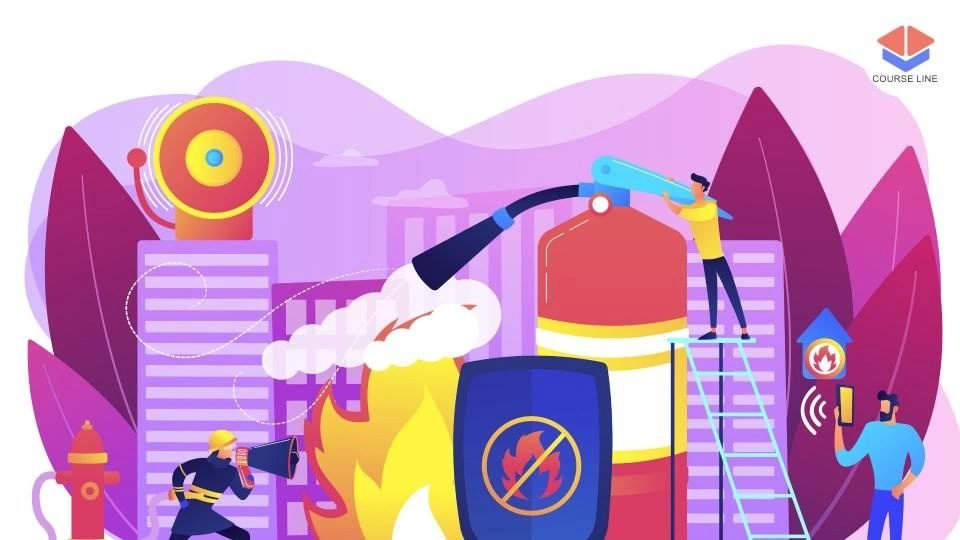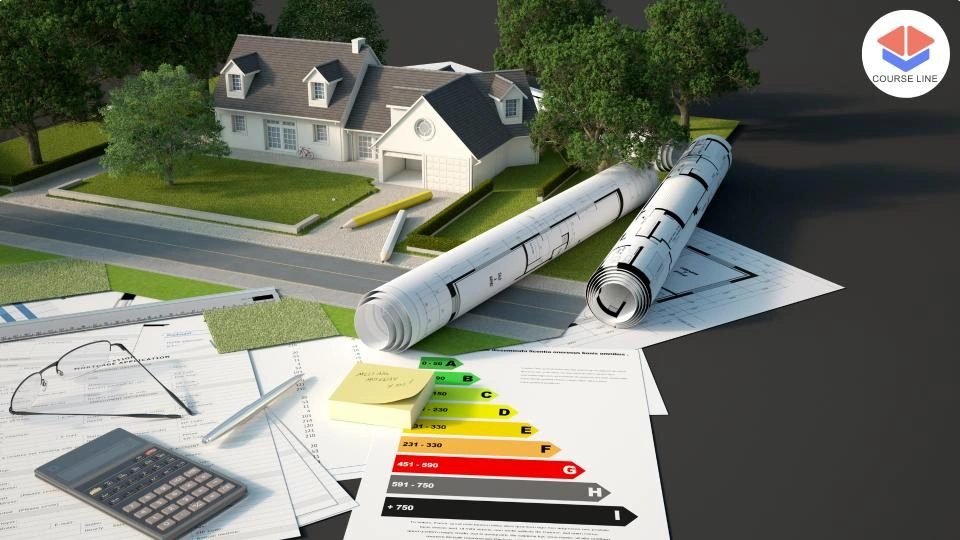Course Features
Price
Study Method
Online | Self-paced
Course Format
Reading Material - PDF, article
Duration
7 hours, 54 minutes
Qualification
No formal qualification
Certificate
At completion
Additional info
Coming soon
- Share
Overview
The Fire Protection Engineering Level 3 Advanced Diploma provides comprehensive knowledge of the engineering and safety measures used to protect people and property from the risks associated with fire. This program begins by introducing the role of fire protection engineering, the science of fire behavior, and the relevant codes, standards, and regulations that govern the industry. Students will gain a solid foundation in fire risk assessments and hazard analysis, which are essential skills for ensuring fire safety across various environments.
The course delves into fire detection and alarm systems, exploring their principles, operation, and different types of detectors, sensors, and alarm systems used to protect buildings and individuals. Students will learn how to maintain, test, and troubleshoot these systems to ensure their effectiveness. The program also covers fire suppression systems, including automatic sprinklers, water-based systems, and special hazard suppression systems, providing insight into their design, installation, and operational considerations.
Students will explore the fundamentals of smoke control and management systems, as well as structural fire protection techniques, including the use of fire-resistant materials and passive fire protection. The course also addresses performance-based fire engineering, introducing students to fire modeling, simulation techniques, and the application of performance objectives in complex structures. Real-world case studies on fire investigation and forensics will deepen students' understanding of fire cause determination and scene examination.
In addition, the course addresses human behavior in fire emergencies and evacuation strategies, ensuring that students can design safe and efficient egress systems. Fire safety management principles, risk assessment, emergency planning, and compliance enforcement are also explored, along with emerging trends in fire protection engineering, such as advancements in fire detection technologies and sustainable practices. By the end of the program, students will be equipped with the knowledge and skills required to contribute to the safety and protection of life and property in fire-related scenarios.
Who is this course for?
The Fire Protection Engineering Level 3 Advanced Diploma provides comprehensive knowledge of the engineering and safety measures used to protect people and property from the risks associated with fire. This program begins by introducing the role of fire protection engineering, the science of fire behavior, and the relevant codes, standards, and regulations that govern the industry. Students will gain a solid foundation in fire risk assessments and hazard analysis, which are essential skills for ensuring fire safety across various environments.
The course delves into fire detection and alarm systems, exploring their principles, operation, and different types of detectors, sensors, and alarm systems used to protect buildings and individuals. Students will learn how to maintain, test, and troubleshoot these systems to ensure their effectiveness. The program also covers fire suppression systems, including automatic sprinklers, water-based systems, and special hazard suppression systems, providing insight into their design, installation, and operational considerations.
Students will explore the fundamentals of smoke control and management systems, as well as structural fire protection techniques, including the use of fire-resistant materials and passive fire protection. The course also addresses performance-based fire engineering, introducing students to fire modeling, simulation techniques, and the application of performance objectives in complex structures. Real-world case studies on fire investigation and forensics will deepen students' understanding of fire cause determination and scene examination.
In addition, the course addresses human behavior in fire emergencies and evacuation strategies, ensuring that students can design safe and efficient egress systems. Fire safety management principles, risk assessment, emergency planning, and compliance enforcement are also explored, along with emerging trends in fire protection engineering, such as advancements in fire detection technologies and sustainable practices. By the end of the program, students will be equipped with the knowledge and skills required to contribute to the safety and protection of life and property in fire-related scenarios.
Requirements
The Fire Protection Engineering Level 3 Advanced Diploma provides comprehensive knowledge of the engineering and safety measures used to protect people and property from the risks associated with fire. This program begins by introducing the role of fire protection engineering, the science of fire behavior, and the relevant codes, standards, and regulations that govern the industry. Students will gain a solid foundation in fire risk assessments and hazard analysis, which are essential skills for ensuring fire safety across various environments.
The course delves into fire detection and alarm systems, exploring their principles, operation, and different types of detectors, sensors, and alarm systems used to protect buildings and individuals. Students will learn how to maintain, test, and troubleshoot these systems to ensure their effectiveness. The program also covers fire suppression systems, including automatic sprinklers, water-based systems, and special hazard suppression systems, providing insight into their design, installation, and operational considerations.
Students will explore the fundamentals of smoke control and management systems, as well as structural fire protection techniques, including the use of fire-resistant materials and passive fire protection. The course also addresses performance-based fire engineering, introducing students to fire modeling, simulation techniques, and the application of performance objectives in complex structures. Real-world case studies on fire investigation and forensics will deepen students' understanding of fire cause determination and scene examination.
In addition, the course addresses human behavior in fire emergencies and evacuation strategies, ensuring that students can design safe and efficient egress systems. Fire safety management principles, risk assessment, emergency planning, and compliance enforcement are also explored, along with emerging trends in fire protection engineering, such as advancements in fire detection technologies and sustainable practices. By the end of the program, students will be equipped with the knowledge and skills required to contribute to the safety and protection of life and property in fire-related scenarios.
Career path
The Fire Protection Engineering Level 3 Advanced Diploma provides comprehensive knowledge of the engineering and safety measures used to protect people and property from the risks associated with fire. This program begins by introducing the role of fire protection engineering, the science of fire behavior, and the relevant codes, standards, and regulations that govern the industry. Students will gain a solid foundation in fire risk assessments and hazard analysis, which are essential skills for ensuring fire safety across various environments.
The course delves into fire detection and alarm systems, exploring their principles, operation, and different types of detectors, sensors, and alarm systems used to protect buildings and individuals. Students will learn how to maintain, test, and troubleshoot these systems to ensure their effectiveness. The program also covers fire suppression systems, including automatic sprinklers, water-based systems, and special hazard suppression systems, providing insight into their design, installation, and operational considerations.
Students will explore the fundamentals of smoke control and management systems, as well as structural fire protection techniques, including the use of fire-resistant materials and passive fire protection. The course also addresses performance-based fire engineering, introducing students to fire modeling, simulation techniques, and the application of performance objectives in complex structures. Real-world case studies on fire investigation and forensics will deepen students' understanding of fire cause determination and scene examination.
In addition, the course addresses human behavior in fire emergencies and evacuation strategies, ensuring that students can design safe and efficient egress systems. Fire safety management principles, risk assessment, emergency planning, and compliance enforcement are also explored, along with emerging trends in fire protection engineering, such as advancements in fire detection technologies and sustainable practices. By the end of the program, students will be equipped with the knowledge and skills required to contribute to the safety and protection of life and property in fire-related scenarios.
-
- Understanding the role and importance of fire protection engineering 00:10:00
- Fire science and behavior 00:10:00
- Codes, standards, and regulations in fire protection 00:10:00
- Risk assessment and hazard analysis 00:10:00
-
- Principles and operation of fire detection systems 00:10:00
- Types of fire detectors and sensors 00:10:00
- Alarm notification and emergency communication systems 00:10:00
- Testing, maintenance, and troubleshooting of fire alarm systems 00:10:00
- Overview of fire suppression systems 00:10:00
- Automatic sprinkler systems and their components 00:10:00
- Water-based fire suppression systems 00:10:00
- Special hazard fire suppression systems (e.g., gaseous agents, foam) 00:10:00
- Design considerations and installation guidelines 00:10:00
- Introduction to structural fire protection 00:10:00
- Fire-resistant materials and their applications 00:10:00
- Passive fire protection systems 00:10:00
- Structural design considerations for fire safety 00:10:00
- Basics of fire investigation 00:10:00
- Fire scene examination and evidence collection 00:10:00
- Fire cause determination 00:10:00
- Case studies and real-world examples 00:09:00
- Fire safety management principles 00:10:00
- Fire risk assessment and mitigation strategies 00:10:00
- Emergency planning and preparedness 00:10:00
- Compliance and enforcement 00:10:00
- Exam of Fire Protection Engineering Level 3 Advanced Diploma 00:50:00

No Reviews found for this course.
Is this certificate recognized?
Yes, our premium certificate and transcript are widely recognized and accepted by embassies worldwide, particularly by the UK embassy. This adds credibility to your qualification and enhances its value for professional and academic purposes.
I am a beginner. Is this course suitable for me?
Yes, this course is designed for learners of all levels, including beginners. The content is structured to provide step-by-step guidance, ensuring that even those with no prior experience can follow along and gain valuable knowledge.
I am a professional. Is this course suitable for me?
Yes, professionals will also benefit from this course. It covers advanced concepts, practical applications, and industry insights that can help enhance existing skills and knowledge. Whether you are looking to refine your expertise or expand your qualifications, this course provides valuable learning.
Does this course have an expiry date?
No, you have lifetime access to the course. Once enrolled, you can revisit the materials at any time as long as the course remains available. Additionally, we regularly update our content to ensure it stays relevant and up to date.
How do I claim my free certificate?
I trust you’re in good health. Your free certificate can be located in the Achievement section. The option to purchase a CPD certificate is available but entirely optional, and you may choose to skip it. Please be aware that it’s crucial to click the “Complete” button to ensure the certificate is generated, as this process is entirely automated.
Does this course have assessments and assignments?
Yes, the course includes both assessments and assignments. Your final marks will be determined by a combination of 20% from assignments and 80% from assessments. These evaluations are designed to test your understanding and ensure you have grasped the key concepts effectively.
Is this course accredited?
We are a recognized course provider with CPD, UKRLP, and AOHT membership. The logos of these accreditation bodies will be featured on your premium certificate and transcript, ensuring credibility and professional recognition.
Will I receive a certificate upon completion?
Yes, you will receive a free digital certificate automatically once you complete the course. If you would like a premium CPD-accredited certificate, either in digital or physical format, you can upgrade for a small fee.
Course Features
Price
Study Method
Online | Self-paced
Course Format
Reading Material - PDF, article
Duration
7 hours, 54 minutes
Qualification
No formal qualification
Certificate
At completion
Additional info
Coming soon
- Share
Bakery Level 5 Advanced Diploma
Course Line237£490.00Original price was: £490.00.£14.99Current price is: £14.99.Energy Management Level 3 Advanced Diploma
Course Line240£490.00Original price was: £490.00.£14.99Current price is: £14.99.





